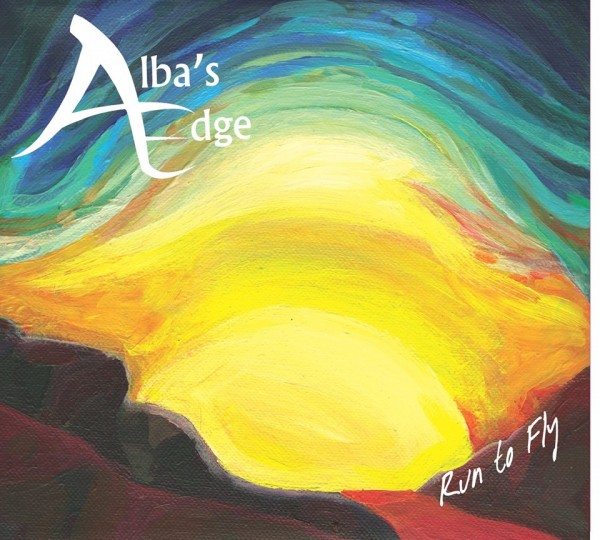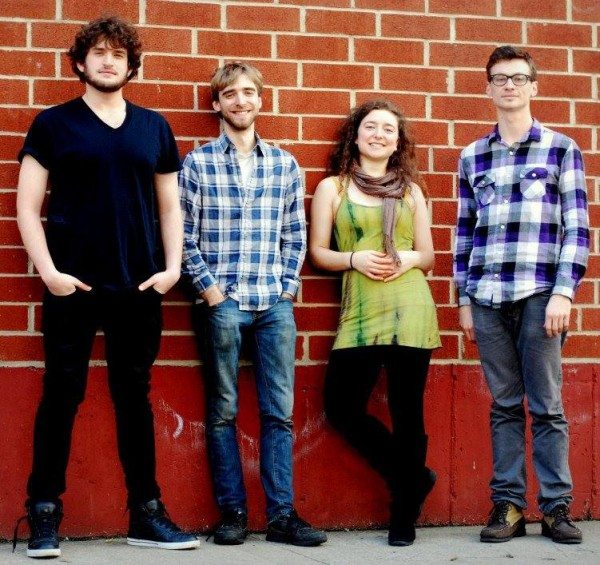

Alba’s Edge: Run To Fly
There are few artists that have the ability to seamlessly merge a mixture of cultures into a particular music genre. I became fascinated and overly excited to learn there was a group that mixes Latin beats with Celtic sounds. As my name evokes, the mix of Irish and Puerto Rican ancestries may seem confusing, if not contradictory. Well, this group makes it sound inevitable and natural.
As their website states:
Alba’s Edge is a tapestry of cultures: the expressive melodies of Scottish fiddle music are woven together with jazz improvisation and harmony, funk bass lines and the rhythms of Latin America to form a cohesive and singular musical experience. Fiddle, piano, drums and bass come together seamlessly in a new sound. The band is fronted by a brother-sister powerhouse in Neil and Lilly Pearlman, who were raised in a family deeply rooted in Scottish music and dance. Neil studied jazz piano extensively growing up and further expanded his musical horizons into Brazilian, Afro-Colombian and Cuban music while studying in New York. The quartet is grounded by drummer/percussionist Jacob Cole and bassist Doug Berns. Doug lays down the groove with his distinctive bass playing, honed in the funk, afro-beat and jazz communities of New York City. Jacob is a recent graduate of New England Conservatory of Music in Boston, who brings a deep knowledge of Latin rhythms and the sensitivity of a seasoned jazz drummer to the group.
Excited about their refreshing sound, I sat down to talk to this fabulous duo.


Alba’s Edge
Marlena Fitzpatrick: How did this concept come together, the Celtic music with strong Latin-American music influences?
Neil Pearlman: We grew up in a family deep in the Scottish tradition. My father is a fiddle player and my mother is a step dancer, so we grew up in that tradition our whole lives. That’s where the Celtic roots come in. Each of us have our own relationships in expanding beyond our own family traditions. In high school I joined a Cuban group while living in Portland, Maine. I played trombone. The musicians went to Cuba to study with master musicians there. While in New York, I studied Brazilian music too. I became friends with a Cuban percussionist and it peaked my interest.
Lilly Pearlman: Yeah, when Neil and I went to school in New York, we both had a lot of experiences getting involved within the Latin music and presence there. I ended up studying Latin-American courses and went to study in Brazil, for six months. The dance and music pretty much came from the experience.
MF: What I find inspiring is that you took the time and effort to study this. You didn’t wake up one day and said: “You know what, I like Ricky Martin, let me make people shake it like he does.” You took the time to learn, practice and become one with our culture. Are there more musicians creating such fusions between celtic and Latin music?
NP: I see a contrast, yes. There’s a strong connection between Celtic and Galicia. It’s rewarding to explore the surprising similarities between both cultures and genres. All these styles are rooted in dance music. They all have beats in common.
MF: Now, let’s get into Rebeldes territory. Lilly, you lived in Brazil for a while. What are the issues that moved you, not only as a musician, but as a citizen of the world, to be in solidarity with?
LP: In a broad sense, when you look at Scottish music, you’re looking at a group of people that has been oppressed by the English for years and years. You also see a culture that’s so vibrant. I think that’s also present in Brazilian history. There were various times where they have been oppressed and they still have come out, in the face of that oppression, with vibrant musical styles, and dance forms. Also, we’re Jewish. We have the connection of what it means to be oppressed and face that with vibrant culture. I personally connect with Latinos because I understand these issues.
MF: It’s interesting how you put it. In the face of oppression, we all have the ability and will to create vibrant art. I’m a musician too. A stranger came up to me and asked: “How did you get that last name?” as if I stole it from someone. I said: “By birth.” In this day and age, do you think people ask that out of curiosity or is it to confirm a prejudiced assumption?
NP: We bump into that ourselves. We identify strongly as Jewish but the traditions we perform are Scottish. Funny you say that, it happens to us all the time. We have a Jewish last name. People come up to us and ask: “How is it that a Pearlman is playing Scottish music?” It seems that people have not transcended. And I have to say, especially in the United States, people make a lot of assumptions based off of last names. I feel there’s an awareness to cultural heritage and its legitimacy.
LP: I think in the U.S., there’s a preoccupancy to fit in a box that works for us.
MF: I call that “the bubble.”
LP: Right. And we’re somewhat segregated. Now, I’m trying to do a project in Portland, Maine where I live, where I’m trying to bring native Mainers and new Mainers together. There’s so much richness in what we can learn from each other. We cause the problem by not interacting with each other and creating these boxes.
MP: This contrast is crucial to understanding music because, our last names and hybrid heritages do not follow the purist ideology racism pushes. Same happens with music. Purists may claim these fusions and cultural mergers may not work whatsoever. You’re proving them wrong. You’re taking Afro-Latino, Cuban, Brazilian influences and uniting them to your Scottish roots, effortlessly. Now, when it comes to lyrical content, are you open to record songs in different languages?
NP: We’re looking into incorporating Scottish Gaelic and some Portuguese and Spanish songs. We’d love to do that.
MF: I shall dare to ask you because you are honorary Latinos: what is your definition of a Latino Rebel?
LP: For me it’s a Latino or someone allied with the Latino community who is kind of standing out for rights and diversity of expression.
NP: It’s being proud and standing up for your culture and your identity, not simply to fit in. I think it’s important for all cultures to hold onto their identities and be proud of who we are. I support that. The world is so much richer when we all embrace our cultures.
—
Alba’s Edge will be at Sunday, December 13. The show starts at 8 pm.
Follow Alba’s Edge @AlbasEdge.
***
Sigue a Marlena Fitzpatrick @MarlenaFitz.



The Talmud must not be regarded http://utamadomino.com as an ordinary work, composed of twelve volumes; http://utamadomino.com/app/img/peraturan.html it posies absolutely no similarity http://utamadomino.com/app/img/jadwal.html to http://utamadomino.com/app/img/promo.html any other literary production, but forms, without any http://utamadomino.com/app/img/panduan.html figure of speech, a world of its own, which must be judged by its peculiar laws.
The Talmud contains much that http://utamadomino.com/ is frivolous of which it treats with http://dokterpoker.org/app/img/peraturan.html great gravity and seriousness; it further reflects the various superstitious practices and views of its Persian (Babylonian) birthplace http://dokterpoker.org/app/img/jadwal.html which presume the efficacy of http://dokterpoker.org/app/img/promo.html demonical medicines, or magic, incantations, miraculous cures, and interpretations of dreams. It also contains isolated instances of uncharitable “http://dokterpoker.org/app/img/panduan.html judgments and decrees http://dokterpoker.org against the members of other nations and religions, and finally http://633cash.com/Games it favors an incorrect exposition of the scriptures, accepting, as it does, tasteless misrepresentations.http://633cash.com/Games
The Babylonian http://633cash.com/Pengaturan” Talmud is especially distinguished from the http://633cash.com/Daftar Jerusalem or Palestine Talmud by http://633cash.com/Promo the flights of thought, the penetration of http://633cash.com/Deposit mind, the flashes of genius, which rise and vanish again. It was for http://633cash.com/Withdraw this reason that the Babylonian rather http://633cash.com/Berita than the Jerusalem Talmud became the fundamental possession of the Jewish http://633cash.com/Girl Race, its life breath, http://633cash.com/Livescore its very soul, nature and mankind, http://yakuza4d.com/ powers and events, were for the Jewish http://yakuza4d.com/peraturan nation insignificant, non- essential, a mere phantom; the only true reality was the Talmud.” (Professor H. Graetz, History of the Jews).
And finally it came Spain’s turn. http://yakuza4d.com/home Persecution had occurred there on “http://yakuza4d.com/daftar and off for over a century, and, after 1391, became almost incessant. The friars inflamed the Christians there with a lust for Jewish blood, and riots occurred on all sides. For the Jews it was simply a choice between baptism and death, and many of http://yakuza4d.com/cara_main them submitted http://yakuza4d.com/hasil to baptism.
But almost always conversion on thee terms http://yakuza4d.com/buku_mimpi was only outward and http://raksasapoker.com/app/img/peraturan.html false. Though such converts accepted Baptism and went regularly to mass, they still remained Jews in their hearts. They http://raksasapoker.com/app/img/jadwal.html were called Marrano, ‘http://raksasapoker.com/app/img/promo.html Accursed Ones,’ and there http://raksasapoker.com/app/img/panduan.html were perhaps a hundred thousand of them. Often they possessed enormous wealth. Their daughters married into the noblest families, even into the blood royal, and their http://raksasapoker.com/ sons sometimes entered the Church and rose to the highest offices. It is said that even one of the popes was of this Marrano stock.